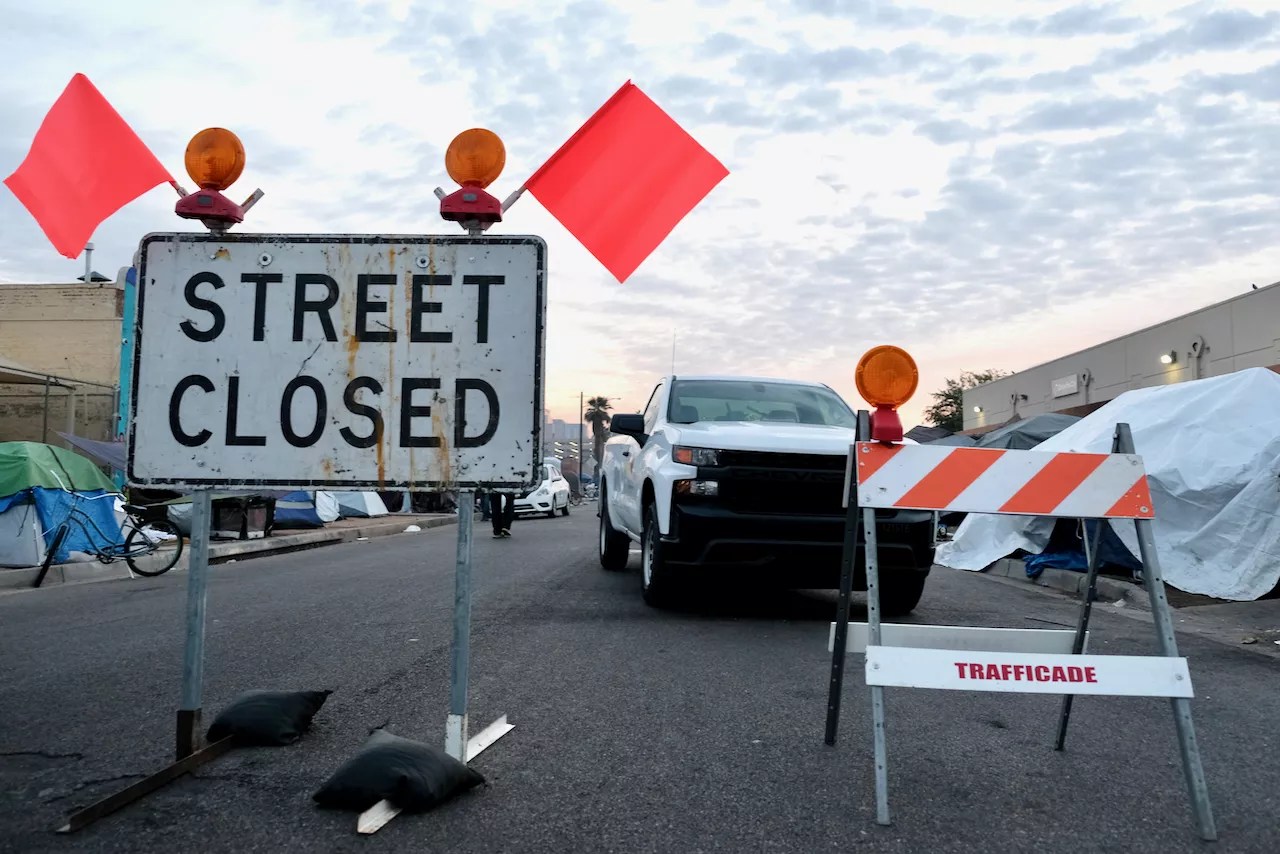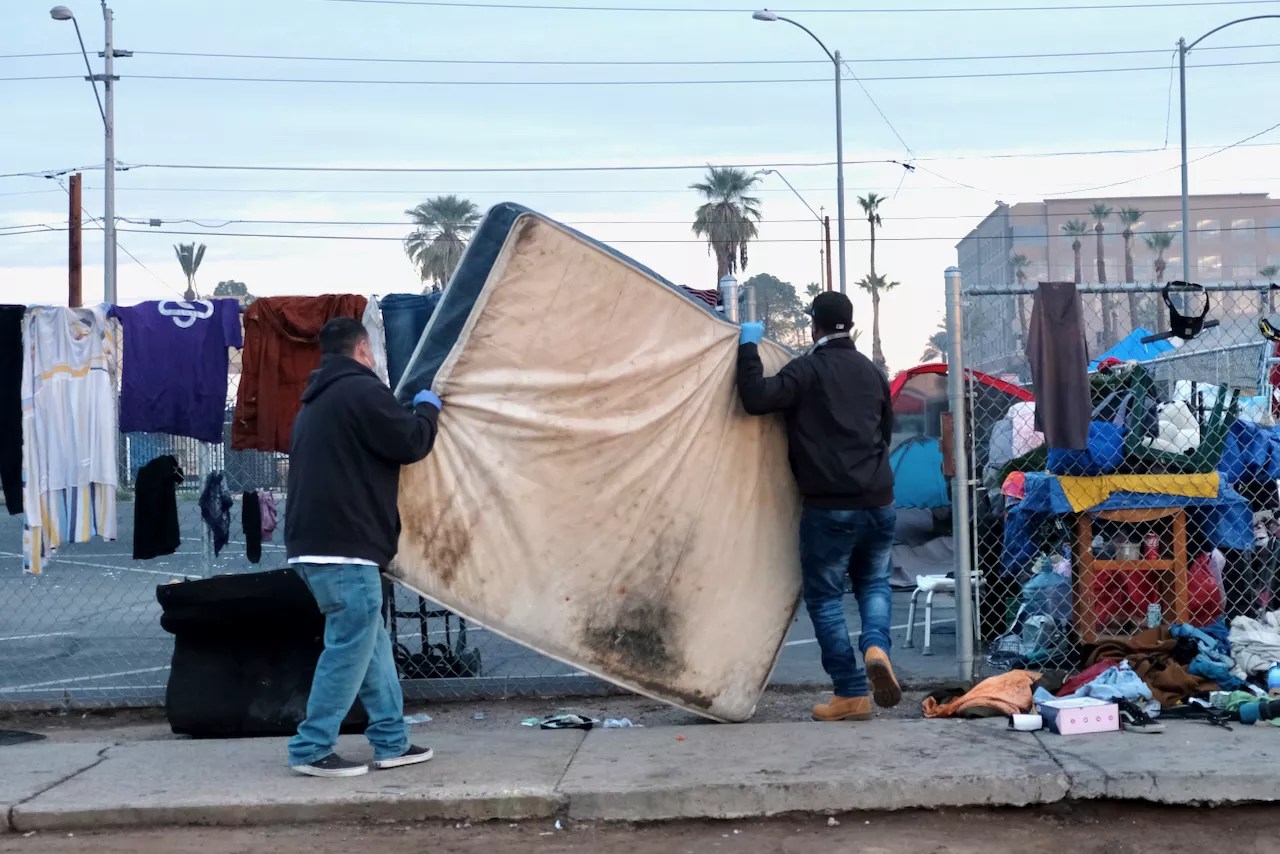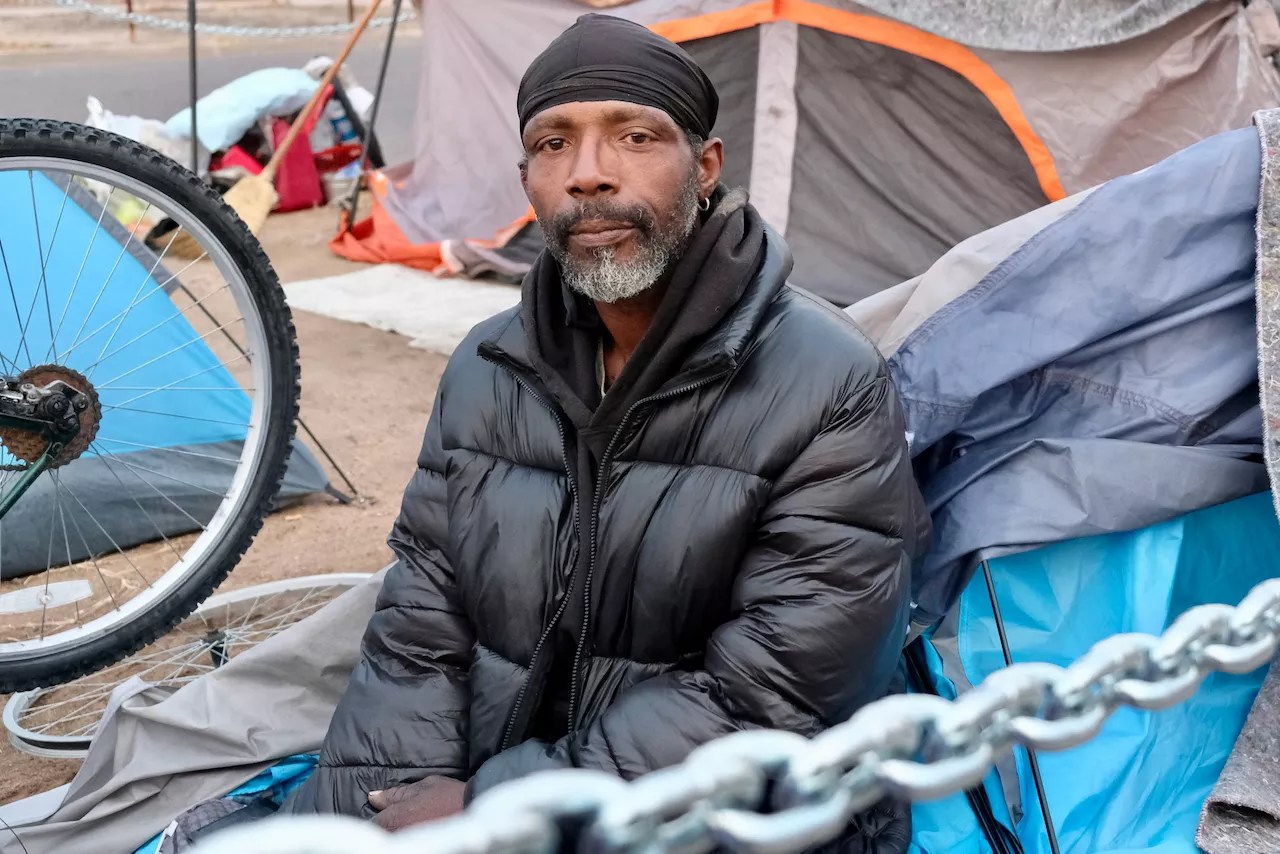
Katya Schwenk

Audio By Carbonatix
At sunrise on Friday, city workers, police cruisers, and garbage trucks arrived along a stretch of Madison Street downtown, and dozens of people living in tents on the block were told that they had to temporarily move.
It was the first sweep in the downtown homeless encampment, known as the Zone, that the city has conducted in months.
As recently as January, the sweeps – which the city calls “enhanced cleanups” and which many activists call “raids” – took place three times a week, sometimes as early as three or four in the morning. People living in the Zone were forced to move their possessions while the area was cleaned and swept, a process that took hours.
Between organized resistance, accusations that personal property was being trashed, and a U.S. Department of Justice investigation, the city was forced to stop the sweeps at the beginning of the year. Since then, the city has allowed the nearly 1,000 people currently residing in tents and other structures along city streets in the Zone to remain without disruption.
The action on Friday was the first step in the city’s plan to restart regular sweeps in the area.

Social services workers helped unsheltered people move their belongings to a nearby parking lot.
Katya Schwenk
‘A Major Difference’ From Past Sweeps
Friday’s sweep was a “pilot,” city staff told Phoenix New Times. Only one block, Madison Street between 12th and 13th avenues, was cleaned. The vast majority of tents in the Zone were left alone. So were the giant dinosaurs that appeared recently.
Still, the cleanup process was lengthy. City staff began at 7 a.m. sharp. By 10 a.m., several tents remained on the block as workers with the nearby Human Services Campus and other service providers continued to help people move their belongings to an empty parking lot.
Despite a buzz of activity – social workers, city staff, activists, and legal observers milled about throughout the morning – the process was largely calm. Also on hand was Fund for Empowerment organizer Frank Urban, who noted the difference between the activity Friday and past sweeps by the city in the area. Urban, one of the plaintiffs in a recent lawsuit against the city over its approach to homelessness, has experienced sweeps in the past. Now, he was keeping watch.
“There’s a major difference,” he said. The city was being cautious. “A lot more cautious,” he added.
Unsheltered people have accused the city for years of destroying their personal property during past sweeps in the Zone and elsewhere. People who left items unattended or who were at work during sweeps often returned to find their property gone, they have said. The U.S. Department of Justice is investigating the practice.
Now, though, the city has been forced to clean up its act.
In November, the American Civil Liberties Union of Arizona, representing two formerly unsheltered organizers with the Fund for Empowerment, sued the city of Phoenix over its sweeps of homeless encampments. Attorneys argued that the city routinely violated the civil rights of unsheltered people by seizing property and disposing of it.
On Thursday, the night before the sweeps resumed, U.S. District Judge Murray Snow issued an injunction that ordered the city to stop seizing property without notice – unless it was part of a crime scene or presented a safety risk – and to store property for at least 30 days before destroying it. The injunction also prevents the city from ticketing people who are camping or sleeping in public unless the city can prove that they are refusing available shelter space.
But the judge stopped short of preventing the city from conducting the sweep on Friday.
At a hearing on Wednesday, Snow hinted at the injunction and said he was troubled by city ordinances prohibiting camping and sleeping that haven’t been changed since 2019. That’s when a Ninth U.S. Circuit Court of Appeals ruling made such ordinances unenforceable if there was no shelter space available. “It does seem to me that the ordinance isn’t on its face unconstitutional, but it does have a number of potential unconstitutional applications,” Snow said.
It also emerged through testimony during the hearing that the city had no written protocol for handling abandoned property in homeless encampments. Although the city has since developed guidelines for its sweeps in the Zone, the protocols were not in place until this fall – after a group of property owners sued over conditions in the encampment.
Snow’s injunction was a victory for the ACLU and activists who had pushed for oversight of the city’s practice of clearing encampments.
“The order makes it clear – the city of Phoenix can’t destroy people’s belongings or target them with criminal sanctions due to their unhoused status,” Benjamin Rundall, an ACLU attorney, wrote in a statement after the judge’s order.

Joseph Gorden, who lives in the Zone, said the cleanup was a hassle but that he was unfazed by it.
Katya Schwenk
Just the Beginning
On Friday morning, Joseph Gorden was packing up his tent and bike to be moved. Gorden has been living in the Zone for about a week. He ended up on the streets after a divorce. At some point over the last seven days, he lost his wallet, he said.
“I’m trying to get myself back together again,” he said. He hadn’t managed to make contact with city workers or social workers in his time in the encampment, and had no leads on housing. But he was hopeful.
Gorden was mostly unfazed by the cleanup, he said. Though it was a bit of a hassle, “it doesn’t bother me too much.”
By 11 a.m., everyone on the block had moved to a fenced-off area – the Human Services Campus parking lot – with their belongings. Dump trucks moved in to remove items that people left behind. At least one unoccupied tent was marked with caution tape and left alone.
The streets were sprayed with disinfectant and swept. By 1 p.m., people were moving their tents back to the block. Some 30 people were offered a bed in a hotel or shelter and accepted, according to city spokesperson Kristin Couturier.
“So far, it’s gone really well,” Scott Hall, the city’s director of the Office of Homeless Solutions, told New Times midway through the sweep.
But the city still needs to figure out how to scale the cleanups. The process took six hours – and dozens of city workers – on Friday to clean a single block in an encampment that is far larger. For now, the city has no future sweeps scheduled or plans for how often they will be conducted, Hall said.
The city’s plans for the Zone likely depend on the outcome of two dueling lawsuits: the ACLU suit, which is seeking to limit the city’s ability to enforce camping bans and seize property, and the suit brought by more than a dozen property owners in the area, which is seeking to clear out the Zone entirely.
“We think the tents, during the day, need to be gone,” Ilan Wurman, an attorney representing the neighborhood business owners, said during a hearing on Thursday.
As city trucks and staff cleared out as the sweep came to a close on Friday, people in the Zone began the slow process of pitching their tents and putting everything back into place.